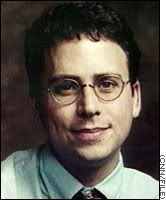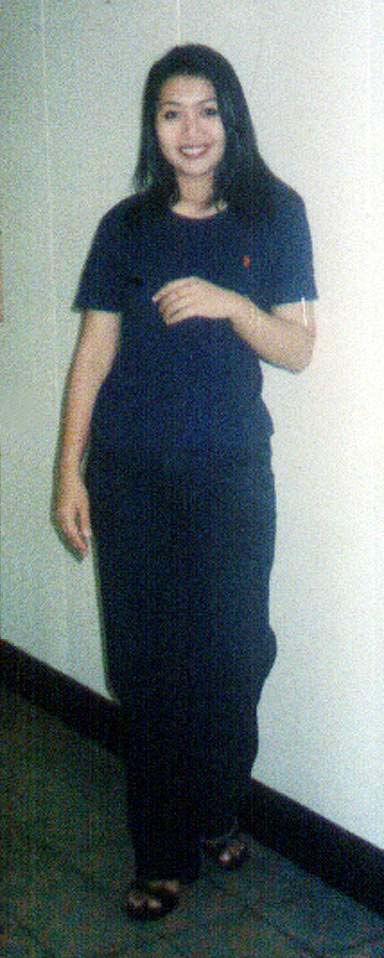
ALyXaNdRiA_BaRBiE (the Sexiest Spy of the Underworld)
"It's the good girls who write in a diary, the bad girls don't have time. Me? I just want a life I am going to remember, even if I don't write it down." Friday, May 20, 2005 Time, 3:12 am
@>----
I saw an officemate reading the book "Eragon" by Christopher Paolini and I thought I'd borrow it when he's done. I expected it to be a not-so-good reading material considering that I haven't read any other books from the 19-year-old author. I was sadly mistaken. The book was really good. It was fun and full of adventure and magic... and the way they talked about dragons seemed very interesting. There were definitely touches of Tolkein's Lord of The Rings in the book, but you can see the author's distinctive style. The book is the first of three series (I'm definitely going to get myself a copy for my collection)... the next one is Eldest, and I don't know the third. The only part I didn't like about the book was Eragon's quest for vengeance... most adventure books these days have that kind of plot and I don't think this should be encouraged because children will think it's okay to waste time, energy and effort to seek vengeance... which, in truth, it really is. Albeit some people would certainly contradict me in that and say vengeance is fulfilling. Oh well, all in all, the book was well-written and I've encountered some new things about dragons. :) Dragons interest me because it's my Chinese sign. I can't wait to read the next installment.... they said Hollywood's going to make a movie about the first book... I wonder how it'll go. I was sorely disappointed with how they treated the Harry Potter movies.... it was vastly different from the books. By the way, I think the name Saphira for a female dragon is really interesting. 
Friday, May 13, 2005 Time, 9:21 pm
@>----
Woke up at 7:30 a.m. today because I had to meet up with Jaimie at YMCA. We played tennis for an hour (8-9 a.m.) and, well, as rusty as I am, she won, of course. Actually, my lousy service in the last two sets made me lose the game. It's okay, though... I felt amazing afterward. Playing tennis always makes me feel.... rejuvenated. :) Time, 2:54 pm
@>----
I just finished watching Star Wars Episode III: Revenge of the Sith and it left me feeling... disappointed. I guess I was just expecting too much because this is the last installment of the Star Wars saga. I expected it to be grand with a very interesting plot... I waited years for this movie, and after I watched it, I could really say, it falls short of my expectations. I should have gone inside the movie house with no expectations whatsoever... I think I would have really loved it. But then again, I love the Star Wars saga, and even if Episodes I, II and III left me wanting, I still liked the thought of having completed everything. I had watched Episodes IV, V and VI when I was a kid, so having watched the prequels gave me immense satisfaction. Besides, seeing Hayden Christensen in this last episode was thrilling... he had really gotten cuter than ever and gotten sexier. There was a scene where he had woken up from a nightmare and got up without a shirt on... I think he has a really gorgeous body. Hehehe :) My officemate, Rommel, gave me one of his invites to the premiere at Greenbelt 3... it was very nice of him. And even if Episode III wasn't what I expected it'd be, I still enjoyed watching the movie... it was totally high-tech and highly digitalized. Well, it's George Lucas, I expected he'd excel at that.   Thursday, May 05, 2005 Time, 1:47 am
@>----
I had just finished watching "Shattered Glass," a true story about a journalist of The New Republic Magazine who fabricated stories for esteem. His name is Stephen Glass (the actor who played him in the movie was Hayden Christensen).  Stephen Glass  Hayden Christensen It was a scary movie... not in the sense that there were monsters in it or people being killed... it was scary because stories of journalists fabricating articles are getting rampant these days, and they do it all for the sake of getting up there and being noticed by editors and readers. And being caught in one's own web of lies is terrifying, especially if you're working in a big media outfit. That will definitely be the end of your career. Remember Jayson Blair in the New York Times? He fabricated quotes and materials in several of his stories, too. Big-time journalists like them who fell in disgrace have set really bad examples for people striving to be up there and be known in their field... it makes one think, "if they got away with writing more than 30 articles without their lies getting noticed by the public, maybe we can do it too." See how scary that is? Personally, when it comes to tragedies like these, I think most of the blame lies on the editors. How could they not have checked the facts before letting that story be printed? The researchers should share the blame, too. How could they not have researched everything down to the minutest details? For big newspaper companies, the main reason why lots of errors get printed and escape editors' notice, is the lack of time. Newspaper companies are pressed for time, they have to meet deadlines... I guess these kinds of incidents would really have to depend on the journalist himself... Moral values and ethics should be instilled in him before he has to venture in this field, or in any kind of profession, for that matter. Below is an excerpt I got from www.cbsnews.com Glass talks to Correspondent Steve Kroft in his first interview since his journalism career ended in disgrace. “My life was one very long process of lying and lying again, to figure out how to cover those other lies,” says Glass. “Like a stock graph, there's going to be exceptions in this. But the general trend of the stories is that they started out with a few made up details and quotes. And granted a few too many, of course. But a few. And then they progressed into stories that were completely fabricated. Just completely made up out of whole cloth.” Glass' main job was at The New Republic, a distinguished magazine with a 90-year history of publishing political and social commentary. It also has a reputation for discovering young, talented writers like Glass. He was editor of his college newspaper at the University of Pennsylvania and joined The New Republic as an editorial assistant in 1995. Not long afterward he was assigned to write a story on an arcane piece of Washington legislation. He thought it needed sprucing up and a serial liar was born. “I remember thinking, ‘If I just had the exact quote that I wanted to make it work, it would be perfect.’ And I wrote something on my computer, and then I looked at it, and I let it stand. And then it ran in the magazine and I saw it. And I said to myself what I said every time these stories ran, ‘You must stop. You must stop.’ But I didn't.” “I loved the electricity of people liking my stories. I loved going to story conference meetings and telling people what my story was going to be, and seeing the room excited. I wanted every story to be a home run.” Leon Wieseltier is the literary editor of The New Republic: “He had a way of hovering affably around everything. He was sweet in what turned out to be this very sinister way. He was aching to please.” Wieseltier has worked at the magazine for 20 years. He says he never suspected that Glass was making things up, but it did seem as though he had an uncanny knack for stumbling onto people and stories that seemed too good to be true. It became the trademark of a Stephen Glass story. “Everything around him turned out to be incredibly vivid or zany or in some other way memorable,” says Wieselteir. “And at the meetings, we used to wait for Steve's turn, so that he could report on his next caper. We got really suckered.” His imagination knew no bounds. There was a piece about a political memorabilia convention featuring Monica Lewinski condoms and one about an evangelical church that worshiped George Herbert Walker Bush. But his articles could also be vicious, taking on public figures, like former presidential advisor Vernon Jordan. “I said that he had behaved lecherously towards young women,” says Glass. “And I provided anonymous or poorly identified individuals to say that about him.” “I wanted a story that I thought would be the perfect story. And that the readers would most enjoy to read.” How did this all work? How did Glass draw readers into these lies? “I would tell a story, and there would be fact A, which maybe was true. And then there would be fact B, which was sort of partially true and partially fabricated. And there would be fact C which was more fabricated and almost not true,” says Glass. “And there would be fact D, which was a complete whopper. And totally not true. And so people would be with me on these stories through fact A and through fact B. And so they would believe me to C. And then at D they were still believing me through the story.” By 1998, he was earning more than $100,000 and selling fabricated stories to Rolling Stone, George, and Harper's Magazine. He was also getting his face on television. His articles always generated lots of interest and very few angry letters to the editor. “And that's because much of the time I wrote fictional stories about fictional people at fictional times doing fictional things. And those people don't write letters,” he says. Most magazines, including The New Republic, have fact-checkers assigned to vet articles for any inaccuracies. But Stephen Glass knew how to subvert the process, because he himself had been a fact-checker at the magazine. “I knew how the system worked. And I made it so that my stories could get through. I invented fake notes. I later would invent a series of voice mailboxes and business cards. I invented newsletters. I invented a website,” says Glass. “For every lie I told in the magazine, there was a series of lies behind that lie that I told-- in order to get it to be published.” Consider his notes. With a polished scrawl, Glass drew diagrams of meetings that never occurred attended by people who didn't exist talking about events that never happened. Still, Charles Lane, the executive editor of The New Republic from 1997 to 1999, says the magazine was ultimately accountable. “It was really the magazine's responsibility to ensure that the stuff went in was good journalism. And it totally failed in that respect,” says Lane. “The only thing I think you can say in defense of The New Republic was that we were up against somebody, at the time, who was really determined to deceive the magazine. And that is quite unusual.” Lane, who is now a reporter for the Washington Post, says that Glass might still be duping editors, if it weren't for an online version of Forbes magazine, which was trying to do a follow-up on an article glass had written about a convention of computer hackers in Bethesda, Md. - specifically, a 15-year-old who had hacked into a company called Jukt Micronics and then extorted tens of thousands of dollars not to do it again. The Forbes editors told Lane they were having trouble confirming a single fact. “My first move was to call in Steve. And he came into my office, and the first words out of his mouth were, ‘What did I do?’ That seemed odd,” remembers Lane. “So I told him you’ve got to come back to me right away with the phone number for this guy, and the place to reach that guy. And we'll get in touch with all these sources.” Sure enough, Glass returned with a list of email addresses and phone numbers for everyone featured in the article. “And I started calling them,” says Lane. “And they all turned out to be these weird voice mails. You know, some with seemingly altered voices, and stuff like that. And he gave me an email address for this supposed hacker, this 15-year-old hacker he made up. And I sent him an email, and got weird answers back.” Glass also produced angry emails that he claimed to have received from the adolescent hacker: "I hope you rot in Hell." There was also an agent for hackers that Glass admits never existed. The Center for Interstate Online Investigations and as the Uniform Computer Security Act was also invented as well. “They were real howlers, weren't they? But again, Steve presented the notes,” says Lane. “He presented the material that supposedly backed this up.” Lane says he called the voicemail for The National Assembly of Hackers. He also received a copy of the newsletter, Computer Insider, from Glass – both of which were made up. Glass called it the official publication of the National Assembly of Hackers, which doesn't exist either, but he used it to document a number of facts that he had written in his story. "There isn't that much going down, folks, cause the big conference is coming up." He even went to the trouble to create a Web site for Jukt Micronics. “It was ostensibly a web page from Jukt Micronics, which contained this letter claiming that The New Republic had portrayed them inaccurately in their story,” says Lane. Was the Web site convincing? No, says Lane. “The second I looked at it, I thought, ‘This isn't a real corporate Web site.’ I mean, first of all, it was on AOL members. You know. I mean corporations that make high-tech products in Silicon Valley don't go on AOL members.” Lane eventually demanded that Glass take him to where the big conference had been held. Making it up as he went along, Glass brought him to a complex of buildings in Bethesda, Md. “I'm juggling so much at this point and I just made so many more lies on top of what's in my story I can't even remember what's in my story,” says Glass. Did he know what this building was? “I had never been in this building in my life,” says Glass. It turned out to be a poor choice. “I came in here with Chuck and I sort of looked around at this area and I just said, ‘This is it, you know, this is where the conference was.’ And he said, ‘The conference was here?’ I'm like, ‘Yes, the conference.’" It was definitely not the most likely site for a conference. “I think it's impossible to have a conference in here,” admits Glass, who then said that Lane told him the same thing. “Yeah and so then I lied again. I just said, ‘You know, there were tables around the perimeter.’ I just was thinking up anything I could, you know.” And with that, the journalistic career of Stephen Glass ended. He dropped out of sight and spent much of the past five years in therapy, trying to start over. He has earned a law degree from Georgetown University and written a book for a six-figure advance. This time, it's clearly labeled fiction: A novel called “The Fabulist” about a young Washington reporter who is a pathological liar. “What I did hurt the people I worked with. It hurt my editors. It hurt my family. It hurt my friends. It hurt the readers,” says Glass. Several people at The New Republic told 60 Minutes that when this whole thing started to unravel, Glass literally cried on their shoulders. “Yeah,” says Glass. “I’m sure I did.” But then he admits that he continued to lie to them. Did he ever apologize to any of them? “This is the very beginning of a very, very long process of apologies. I didn't apologize to people. Because I was so ashamed.” Certainly Glass could forgive them for perhaps being a little bit cynical about this apology, since he’s doing it on national television and not in person. “I don't think that's right though, saying because I'm doing it on national television,” says Glass, even though he has a book out now about his life and hasn’t been in touch with these people for five years. “I didn't want to give an apology when I didn't yet understand why I had done what I had done wrong,” says Glass. “And so I've spent five years coming to understand why I have behaved so terribly.” “He's a worm. I have no place in my heart for him any longer,” says Wieseltier, who doesn’t think he can change. “I don't mean to have a hard heart, but I think frankly that what you're covering now is contrition as a career move. I have no reason to believe otherwise.” Glass now lives in New York City, and has written a novel about his life called “The Fabulist.” He hopes to be admitted to the state bar, and he's passed the written exam - but there are questions about his character and his fitness to practice law. Now, is the Stephen Glass in this 60 Minutes interview really Stephen Glass or just another character that he has invented? “I know people are going to think that," says Glass. "And while I know I am not inventing the person I'm sharing with you now, I can't make you believe that. All I can do is continue to behave in a way that earns your trust.” “If it was sunny outside and Steve and I were both standing outside in the sun and Steve came to me and said, ‘It's a sunny day,’ I would immediately go check with two other people to make sure it was a sunny day,” says Lane. Monday, May 02, 2005 Time, 2:13 am
@>----
I admit it! I am a huge Star Wars fan.... a Star Wars freak... and I had been waiting for this last Star Wars installment for years. As in totally. I have searched for spoilers of Episode III years ago, right after I finished watching Episode II. And they're finally going to show the last episode in cinemas worldwide on May 19 and I'm eagerly counting the days (as I know every Star Wars buff is doing as well). *Hayden looks so cute in the Episode III trailers.*  |



Hi! I'm: ALyXa BaRBiE :) (people who are really close to me call me Jinji), 26 years old and an eternal Peter Pan
"Dream what you want to dream, go where you want to go, be what you want to be, because you only have one life to live and one chance to do all the things you want to do." ;0) Send me feedback at:
My hometown:
ICQ number and YM:
More Sites:
Archives: Previous Posts
Archives


 
|
 ALyXaNdRiA
ALyXaNdRiA
